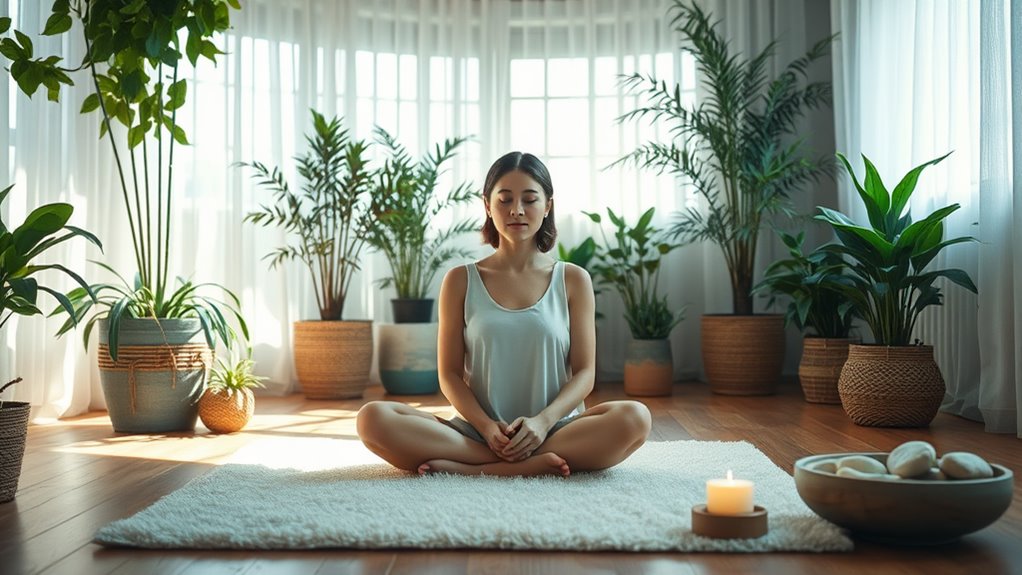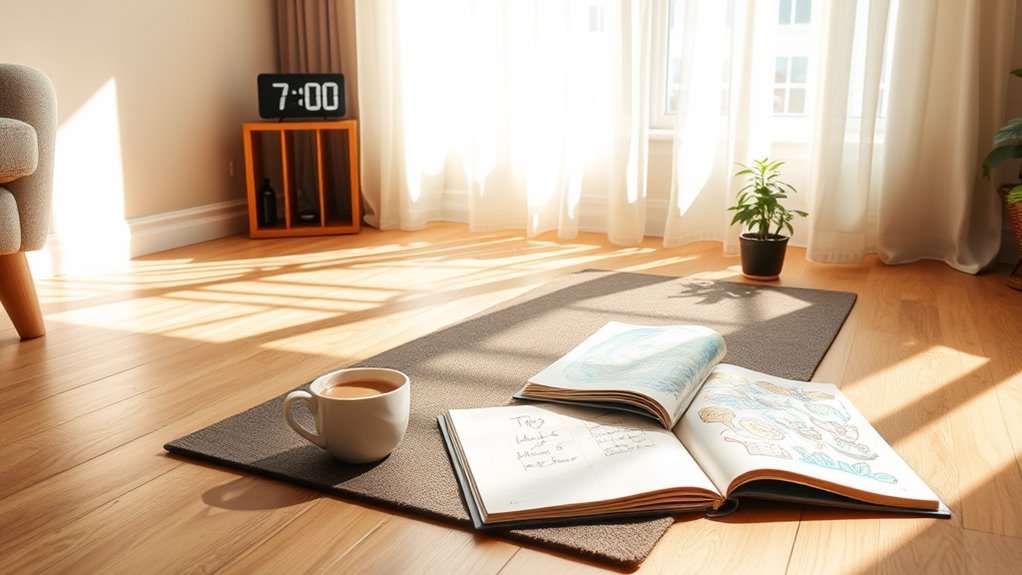Meditation Secrets- How I Transformed My Mind and Body
Meditation can transform your mind and body by harnessing the power of breath and mindfulness. By mastering conscious breathing, you ground yourself in the present, enhancing focus and awareness. Techniques like guided visualization and body scans help release tension, while mindful breathing promotes better physical health, including improved digestion and sleep. You’ll discover that integrating mindfulness into daily activities can further enrich your experience. Explore how these practices can lead to profound changes.
Key Takeaways
- Mastering mindful breathing techniques created a bridge between my mind and body, enhancing my meditation practice.
- Incorporating guided visualization and mantra repetition helped me focus and cultivate inner calm during meditation sessions.
- Regular meditation significantly reduced my stress levels, leading to improved mental clarity and energy.
- Practicing mindfulness in daily life, such as mindful eating and conscious breathing, reinforced the benefits of meditation outside of sessions.
- I observed tangible physical health benefits, including lower blood pressure and better sleep quality, through consistent meditation practice.
Discovering the Power of Breath
When you take a moment to focus on your breath, you release a powerful tool for enhancing your meditation practice.
Breathing acts as a bridge between your mind and body, grounding you in the present moment. By mastering your breath, you cultivate awareness and stillness, essential for deepening your meditation experience.
Start with slow, intentional inhalations and exhalations, allowing each breath to guide you inward. Notice the sensations, the rhythm, and how it influences your state of mind.
As you become adept at this, you’ll find that your meditation transforms from a mere routine into a profound journey. Mindful breathing techniques are crucial for integrating this practice effectively.
Embrace the power of breathing; it’s your key to revealing deeper states of tranquility and insight.
My Journey Into Meditation
Three years ago, I stumbled upon meditation while searching for a way to manage stress and find inner peace.
You’ll quickly discover that meditation isn’t just about sitting in silence; it’s a transformative journey. Initially, you might feel restless, your mind racing with thoughts. Embrace that discomfort.
With practice, you’ll learn to observe those thoughts objectively, slipping into deeper states of focus. You’ll start noticing subtle shifts in your awareness, expanding your understanding of self.
Each session becomes an opportunity to cultivate resilience and clarity. As you deepen your practice, the world around you may begin to feel more vibrant and alive. Incorporating breathing techniques into your routine can further enhance your meditation experience.
Trust the process, stay committed, and you’ll reveal the profound benefits that meditation has to offer.
Techniques That Changed My Practice
As I explored deeper into meditation, I discovered several techniques that truly transformed my practice.
These methods not only enhanced my focus but also deepened my mindfulness. You can integrate them into your routine for significant growth:
-
Guided Visualization: Picture serene landscapes, allowing your mind to wander peacefully.
-
Body Scan: Tune into each part of your body, releasing tension and fostering awareness.
-
Mantra Repetition: Use a powerful phrase to anchor your thoughts and cultivate inner calm.
-
Breath Counting: Count your breaths to maintain focus and heighten your concentration.
Additionally, incorporating deep breathing techniques can significantly amplify your stress relief and overall mindfulness experience.
The Impact on My Physical Health
Integrating these meditation techniques into my routine not only transformed my mental clarity but also greatly impacted my physical health.
You’ll notice a surge in energy levels, allowing you to tackle daily challenges with vigor. Regular meditation can lower blood pressure, reducing stress on your cardiovascular system.
You’ll also experience improved digestion, as mindful breathing enhances gut function. Your immune system strengthens, making you more resilient to illnesses.
In addition, meditation fosters better sleep quality, leaving you refreshed and ready for the day. As you cultivate this practice, your body responds positively, revealing a harmonious connection between mind and physical well-being. Harnessing Breath during meditation can significantly enhance these benefits.
Embrace these changes, and watch as your overall health flourishes through this powerful practice.
Cultivating Mindfulness in Daily Life
While you might think mindfulness is reserved for quiet moments on a meditation cushion, you can actually cultivate it throughout your daily life.
Embrace the present by integrating mindfulness into everyday activities. Here’s how you can do it:
-
Mindful Eating: Savor each bite, appreciating flavors and textures.
-
Conscious Breathing: Take a few moments to focus on your breath, especially during stressful situations. This can be enhanced by practicing simple breathing techniques to help clear your mind.
-
Intentional Walking: Pay attention to each step, the ground beneath your feet, and the rhythm of your movement.
-
Active Listening: Engage fully in conversations, absorbing not just words but emotions and intentions.
Frequently Asked Questions
How Long Did It Take to See Results From Meditation?
You might notice results from meditation in just a few weeks, but true mastery often takes consistent practice over months. Stay patient, and you’ll find your mind and body adapting in ways you never imagined.
Do I Need a Quiet Space to Meditate Effectively?
You might think a quiet space is essential, but it isn’t. With practice, you can meditate anywhere, even amid chaos. It’s about focusing your mind, not your environment, that truly leads to transformation.
Can Meditation Help With Anxiety or Depression?
Yes, meditation can greatly help with anxiety and depression. It encourages mindfulness, calming your mind and reducing negative thoughts. By practicing regularly, you’ll cultivate resilience and emotional balance, enhancing your overall mental well-being.
What Should I Do if My Mind Wanders During Meditation?
When your mind wanders during meditation, gently acknowledge the distraction without judgment. Bring your focus back to your breath or mantra. This practice strengthens your ability to remain present, enhancing your meditation experience over time.
Is There a Best Time of Day to Meditate?
There isn’t a universally best time to meditate; it depends on your schedule and energy levels. Experiment with mornings, afternoons, or evenings, and find what resonates with you for deeper focus and clarity.





